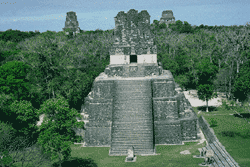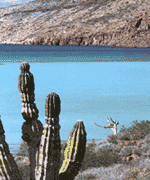 |
World Heritage and Ecotourism: A Banner Year - October
2002
 |
The
multi-trillion dollar tourism industry is unstoppable, with an immeasurable
impact in every corner of the world. In developing countries especially,
tourism can take a heavy toll on local cultures and environments while
potentially offering enormous benefits to both economies and national
heritage - such as providing jobs, preserving traditions and customs,
and reducing poverty.
The complex relationship between tourism and the future of our planet
has never been more prominent on the World Heritage agenda than in
2002, the International Year of Ecotourism, featuring major events
including the World
Ecotourism Summit held in Québec City, Canada, in May and
the International
Ecotourism Conference in Cairns, Australia, in October. This year
is also expected to see the finalization of guidelines under the Convention
on Biological Diversity aimed at minimizing the negative impacts
of ecotourism in vulnerable ecosystems. |
Ecotourism, sustainable tourism or "tourism
with a conscience" is a less intrusive, more ecology-friendly
way to experience the world's unique natural and cultural treasures.
Now more than ever, the tourism industry is challenged to protect
and promote cultural heritage and the environment, while helping to
reduce poverty by creating job opportunities around the world.
|
 |
 |
More than 1,000 participants from 132 countries attended the Québec
City summit, issuing a Declaration on the development of ecotourism
in the context of sustainable development, which was delivered to
the World Summit on Sustainable Development held in August/September
in Johannesburg.
The Cairns summit plans to draft a "Charter on Public-Private
Partnerships for Ecotourism" addressing codes of conduct, developing
sustainable ecotourism products, equitable distribution of costs and
benefits, and international policy. A "cross-cutting" theme
is that of involving and empowering communities and indigenous peoples
in sustainability.
|
Sustainable tourism is especially fertile ground for partnerships
among industries, governments, international institutions and non-governmental
groups. A perfect example is a project that won new private and public
funding, fittingly, just as the International
Year of Ecotourism was about to be launched in January. The UN
Environment Programme, the World Heritage Centre, and the non-profit
RARE
Center for Tropical Conservation joined hands in a three million
US dollar project to link conservation of biodiversity and sustainable
tourism at six World Heritage sites (in Guatemala, Honduras, and two
each in Mexico and Indonesia). The project will create a model for
using tourism to promote the protection of important habitats as well
as empowering local communities to benefit from the growing tourism
industry. It has received US$500,000 dollars from the international
cosmetics company Aveda, which is being matched by the UN Foundation.
|
 |
| Back |
|
 |






